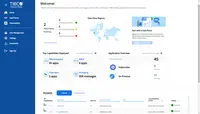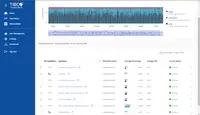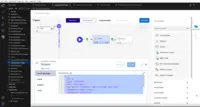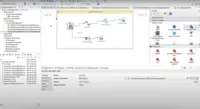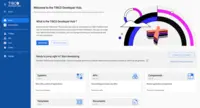TIBCO Integration (including BusinessWorks and Flogo)
Overview
What is TIBCO Integration (including BusinessWorks and Flogo)?
TIBCO Integration is used to connect diverse business solutions, data sources, and devices into a single, seamless system.
Broaden your horizon with Scribe
The Best integration tool in the world.
A good project accelerator
Could be better, does some of the jobs, but gets frustrating for API calls. Documentation is also too generic and they need recipes.
Stay tuned on data with TIBCO Businessworks!
TIBCO BUSINESSWORKS - More than just an Integration tool
Scribe Integration to Microsoft Dynamics GP
TIBCO Cloud Integration (including BusinessWorks and Scribe) at a glance!
Trust My Review
TIBCO Cloud Integration (including BusinessWorks and Scribe) is great!
TIBCO and Sales Order Process.
Empowering Seamless Integration with TIBCO Cloud Integration's Versatility and Performance
Seamless integration made easy
Reasons to use TCI
How TIBCO Integration (including BusinessWorks and Flogo) Differs From Its Competitors
TIBCO Platform Integration
TIBCO Platform Integration
Business Impact
Deployment
Flexibility
Reliability and Strength
Decision Factors
Cloud Benefits
TIBCO Investment Preservation
Future Proofing
Customer Feedback
Requirements
Future Use
TIBCO Cloud Integration Learning from the Community
TIBCO Platform Integration
Tasks Accomplished
TIBCO Platform Integration
Little early to comment on the impact of …
TIBCO Products Used
Tasks Accomplished
Business Impact
Deployment
Flexibility
Reliability and Strength
Decision Factors
TIBCO Platform Integration
TIBCO Cloud Integration Impact
Lessons for Success
Cloud Benefits
Cloud Migration
TIBCO Investment Preservation
Future Proofing
Customer Feedback
Another really annoying thing: The mappings …
Requirements
Considerations
Future Use
Decision Factors
Recommendations
Deployment
Integrations
Integration Special Use case
TIBCO Cloud Integration Learning from the Community
TIBCO Cloud Integration Tips and Tricks
TIBCO Cloud Integration Favorite Features
2. Multiple agents: My solutions can connect to different agents on different on-premise systems. This speeds up the integration a lot
3. Lots of connectors: These are really helpful with most of the common data sources
TIBCO Cloud Integration Features You Wish You'd Used Sooner
TIBCO Cloud Integration Feature Differentiators
TIBCO Platform Integration
TIBCO Cloud Integration Impact
Lessons for Success
TIBCO Cloud Integration Impact
Lessons for Success
The most important lessons is that instead of writing custom tool / code which would take up more effort, time and cost, the organization should go with time-proven solution like TIBCO Cloud Integration for all the …
Cloud Benefits
Cloud Migration
TIBCO Investment Preservation
Future Proofing
Customer Feedback
Requirements
Cloud Benefits
Cloud Migration
TIBCO Investment Preservation
Future Proofing
Customer Feedback
TIBCO Cloud Integration Favorite Features
- Deploy directly from Business Studio with few click
- Out of the box integration to expose private endpoints only with Tibco Mashery
- Scaling directly from the UI
TIBCO Cloud Integration Features You Wish You'd Used Sooner
TIBCO Cloud Integration Feature Differentiators
There is still some limitation but Messaging provide out of the box many solutions. In Cloud world is a point to consider.
TIBCO Cloud Integration Impact
Lessons for Success
Cloud Benefits
Cloud Migration
TIBCO Investment Preservation
Future Proofing
Customer Feedback
Requirements
Considerations
Future Use
Decision Factors
Recommendations
Deployment
Integrations
Integration Special Use case
TIBCO Cloud Integration Onboarding Wisdom
TIBCO Cloud Integration Tips and Tricks
TIBCO Cloud Integration Favorite Features
TIBCO Cloud Integration Features You Wish You'd Used Sooner
TIBCO Cloud Integration Feature Differentiators
TIBCO Cloud Integration Impact
Lessons for Success
TIBCO Cloud Integration Impact
Lessons for Success
TIBCO Cloud Integration Impact
Lessons for Success
Requirements
Considerations
It is difficult to indicate other IPaaS solutions since there is not much competition in this type of services, since many organizations have seen the need to mount an IaaS solution to be able to install integration products. It is also important that TIBCO CI not only offers APIs layer but also …
Future Use
From my point of view, this growth model is very oriented to internet-scale business models, and here is a strength of TIBCO CI given that being an IPaaS solution it allows to have elasticity strategies, and step by use that allow these prepared for unexpected consumption peaks, also the speed of …
Decision Factors
To choose TIBCO Cloud Integration, there are several criteria where this platform provides added value, such as the agility of generation of integration and interoperability solutions, the adequate management of autonomy provided by the architecture to support the workloads. In the case of …
Recommendations
For this type of decision, the advantage that TIBCO CI has is that it appears in Gartner, the second scenario is the strength of the manufacturer in this case TIBCO in solutions of this type. In the technical aspects, the ease of generating solutions must be taken into account and being able to …
Integration Special Use case
TIBCO Cloud Integration Onboarding Wisdom
TIBCO Cloud Integration Learning from the Community
TIBCO Cloud Integration Tips and Tricks
TIBCO Cloud Integration Favorite Features
- The different connectors ready to configure and …
TIBCO Cloud Integration Features You Wish You'd Used Sooner
TIBCO Cloud Integration Feature Differentiators
TIBCO Cloud Integration Impact
TIBCO Cloud Integration Favorite Features
We further developed in-house integrations for digital strategies
Also, helped us maintain some mission-critical applications
TIBCO Cloud Integration Feature Differentiators
TIBCO Cloud Integration Impact
Integration Special Use case
TIBCO Cloud Integration Onboarding Wisdom
TIBCO Cloud Integration Learning from the Community
TIBCO Cloud Integration Tips and Tricks
Create a job to actually delete the target records marked as 'Deleted'.
TIBCO Cloud Integration Favorite Features
TIBCO Cloud Integration Features You Wish You'd Used Sooner
TIBCO Cloud Integration Impact
Lessons for Success
We learned that sometimes Tibco Scribe is not up to date when it comes to changes in the REST api or changes Microsoft implements on the database, which caused the …
Decision Factors
Recommendations
And the relationship the …
Deployment
Integrations
Integration Special Use case
TIBCO Cloud Integration Onboarding Wisdom
But also be prepared to …
TIBCO Cloud Integration Learning from the Community
So to be honest I've got very little experience with the Tibco Community, on the other …
TIBCO Cloud Integration Tips and Tricks
This is one aspect users of the …
TIBCO Cloud Integration Favorite Features
TIBCO Cloud Integration Impact
Decision Factors
Recommendations
Decision Factors
Prices were negotiated, since we were loyal tibco customers.
Also TIBCO Cloud simplifies the way data are captured, applications connect, and turn …
Deployment
- A highly available architecture
- A VPC configured with public and private subnets according to AWS best practices
- An Internet Gateway to allow access to the WEB
- In public subnets, NAT Gateways managed to authorize outgoing …
Integrations
- AWS CloudWatch Logs
- AWS ECR Repository
- AWS S3 bucket
TIBCO Cloud Integration Favorite Features
2- The Drag and Drop feature that easily allow developer to create flow, parse messages, and perform complex mapping.
3- The software is very user friendly.
TIBCO Cloud Integration Features You Wish You'd Used Sooner
TIBCO Cloud Integration Feature Differentiators
TIBCO Cloud Integration Impact
TIBCO Cloud Integration Favorite Features
TIBCO Cloud Integration Features You Wish You'd Used Sooner
TIBCO Cloud Integration Feature Differentiators
TIBCO Cloud Integration Impact
TIBCO Cloud Integration Impact
Lessons for Success
Integration Special Use case
TIBCO Cloud Integration Onboarding Wisdom
TIBCO Cloud Integration Tips and Tricks
TIBCO Cloud Integration Impact
Lessons for Success
TIBCO Cloud Integration Favorite Features
1. Easy of use - the tool is easy to use and can be taught (at a basic level) to most end users; not requiring a huge understanding of computer programming.
2. Logging - the tool has vast logging mechanism built in; though the alert …
TIBCO Cloud Integration Features You Wish You'd Used Sooner
TIBCO Cloud Integration Feature Differentiators
Awards
Products that are considered exceptional by their customers based on a variety of criteria win TrustRadius awards. Learn more about the types of TrustRadius awards to make the best purchase decision. More about TrustRadius Awards
Popular Features
- Pre-built connectors (120)7.575%
- Support for real-time and batch integration (117)7.070%
- Monitoring console (120)6.969%
- Connector modification (8)5.555%
Reviewer Pros & Cons
Pricing
What is TIBCO Integration (including BusinessWorks and Flogo)?
TIBCO Integration is used to connect diverse business solutions, data sources, and devices into a single, seamless system.
Entry-level set up fee?
- Setup fee optional
Offerings
- Free Trial
- Free/Freemium Version
- Premium Consulting/Integration Services
Would you like us to let the vendor know that you want pricing?
Alternatives Pricing
What is Azure Logic Apps?
Microsoft offers the Azure Logic Apps as a cloud-based integration service, supporting data and application integration.
What is SAP Integration Suite?
SAP Integration Suite is an integration platform-as-a-service (iPaaS) that helps quickly integrate on-premises and cloud-based processes, services, applications, events, and data. It is used to accelerate innovation, automate more processes, and realize a faster time to value.
Features
Cloud Data Integration
Cloud data integration software simplifies the task of integrating data from multiple different cloud applications
- 7.5Pre-built connectors(120) Ratings
Pre-built, tested connectors to a wide variety of applications such as ERP, CRM, HCM, Marketing Automation, etc.
- 5.5Connector modification(8) Ratings
Provision for modification of pre-built connectors to suit specific environments
- 7Support for real-time and batch integration(117) Ratings
Software supports both real-time and batch integrations
- 5.5Data quality services(6) Ratings
Software includes capability to perform data profiling, deduplication, cleansing etc.
- 2.7Data security features(7) Ratings
Data security features include rights management, LDAP integration, password encryption, etc.
- 6.9Monitoring console(120) Ratings
Central console for monitoring resource utilization, system health, ability to start and stop processes, etc.
Product Details
- About
- Integrations
- Competitors
- Tech Details
- Downloadables
- FAQs
What is TIBCO Integration (including BusinessWorks and Flogo)?
TIBCO Integration is used to connect diverse business solutions, data sources, and devices into a single, seamless system. TIBCO accelerates connectivity initiatives with low and no-code experiences engineered to reduce development time and costs. Users can implement the best-fit style of integration to address any app, data, IoT, B2B and mobile/web integration use case. TIBCO Integration can connect to virtually any endpoint across the IT ecosystem with 200+ pre-built connectors for a wide variety of business suites, databases and legacy technologies.
TIBCO Integration (including BusinessWorks and Flogo) Features
Cloud Data Integration Features
- Supported: Pre-built connectors
- Supported: Support for real-time and batch integration
- Supported: Monitoring console
Additional Features
- Supported: No-code Business Process Automation
- Supported: No-code Graphical Designer
- Supported: Container and PaaS Support
- Supported: Enterprise Scale
TIBCO Integration (including BusinessWorks and Flogo) Screenshots
TIBCO Integration (including BusinessWorks and Flogo) Integrations
- Salesforce Sales Cloud
- HubSpot Marketing Hub
- Microsoft SQL Server
- Adobe Marketo Engage
- Microsoft Dynamics GP
- SAP ERP, ECC
- MySQL
- NetSuite ERP
- PostgreSQL
- Salesforce Marketing Cloud
- ServiceNow IT Service Management
- Shopify
- Google Analytics
- Jira Software
- Sage Intacct
- ON24
- Oracle Marketing
- Oracle Database (legacy)
- Sugar Sell (SugarCRM)
- Microsoft Dynamics 365 Business Central
- Microsoft Dynamics 365
- Microsoft Dynamics AX, discontinued
- Adobe Commerce (Magento Commerce)
TIBCO Integration (including BusinessWorks and Flogo) Competitors
TIBCO Integration (including BusinessWorks and Flogo) Technical Details
| Deployment Types | On-premise, Software as a Service (SaaS), Cloud, or Web-Based |
|---|---|
| Operating Systems | Windows, Linux, Mac |
| Mobile Application | No |
| Supported Countries | Global |
| Supported Languages | English |
TIBCO Integration (including BusinessWorks and Flogo) Downloadables
Frequently Asked Questions
Comparisons
Compare with
Reviews and Ratings
(502)Attribute Ratings
- 1Likelihood to Renew28 ratings
- 8.9Availability6 ratings
- 7.2Performance6 ratings
- 4.5Usability23 ratings
- 7.3Support Rating28 ratings
- 5.6Online Training3 ratings
- 1.3In-Person Training5 ratings
- 10Implementation Rating8 ratings
- 7.3Configurability5 ratings
- 7.8Product Scalability23 ratings
- 7.3Ease of integration21 ratings
- 7.3Vendor pre-sale4 ratings
- 7.3Vendor post-sale6 ratings
Reviews
(1-25 of 85)TIBCO user
- It is immediate thanks to the graphical interface
- Very useful for creating web services
- You can integrate many systems between them
- It can integrate cloud systems
- It should be more stable
- It should also be an open source version
- It should incorporate test data management, such as queues or database
- Add more plugins
Broaden your horizon with Scribe
- Integration abstraction
- Extensive ecosystem of connectors
- Management of integration and its dependency on vendor versions
- Ease of usage
- User friendly UI
- Granular security
- Improved monitoring and troubleshooting capability
- More out of the box templates
Could be better, does some of the jobs, but gets frustrating for API calls. Documentation is also too generic and they need recipes.
- data replication
- data sync
- API calls
- JSON Normalization
Stay tuned on data with TIBCO Businessworks!
- Access to real-time data across different environments.
- No need to know a specific language code.
- Expose multiple business processes as web methods under one service.
- Manage JDBC.
- Global Variables.
- SOAP over HTTP.
- Automation of development pipelines
- Use of microservices for Agile SDLC
- Automation of business process and workflows
- Still figuring out debugging
- Integration with other TIBCO tools can be a tedious task
Reasons to use TCI
- Security policies for authorization and authentication
- Error handling made easy
- Plugins to connect with systems
- Logging - providing a inbuilt log framework
- Feature to easily generate yaml files
Less appropriate if there are complex transitions and business logics to be implemented
Great for Dynamics CRM
- Easy integration, even for non-programmers
- It can connect to a lot of different systems/databases easily
- The support is helpful and questions are answered fast and professionally. And if nothing helps, you get remote live-support
- Good on-site training available
- It is fast and (the CRM module) has the ability to cache query results
- Export and import of mappings are very easy
- Easy change of connections in (imported) mappings
- The debugger is a pain. Sometimes it is hard to find an issue
- It is not possible to split the integrations into steps. You need to copy/paste (and maintain) integration-steps that are used in multiple integrations
- You cannot call a flow from another flow
TIBCO Cloud Integration delivers!
- Data integration.
- Data replication.
- Ease of use.
- Intuitive
- Make more tools/features available which used to be available on Scribe Insight.
- Improve change tracking.
- Add versioning.
An expensive replacement for Insight
- MS SQL
- Dynamics GP
- Database Connectivity
- Local Agent
- Development Environment is not great
- Bring back Scribe Insight!!! On Premise install is often better than the cloud.
- Scribe online helps support complex integration scenarios especially in case of XML structure with parent-child relationships.
- Scribe online interface is very user friendly and intuitive.
- It doesn't require any programming skills to implement to complex scenarios.
- We faced one issue with The XML Source component of Scribe Insight which wasn't not in the Scribe Online version. "Repeating nodes are not supported for cousins, siblings, etc. Multiple repeating nodes must be related linearly to repeating nodes that already exist. Thus, a new repeating node must be a grandparent, parent, child, grandchild, etc., to an existing repeating node." The product can be updated to include the repeating nodes support.
- Scribe Insights Interface can be updated and be made more user friendly - basically like the Scribe Online interface
- Cost is also one of the factor, usually, when it comes to Dynamics CRM/365 Integration most of the places, we have customers using KingswaySoft instead of Scribe.
BW Man
Main scenario: Integrate internal source systems based on different technologies with SAP C4C CRM. An event based architecture was built using an In-Only pattern based on XML over JMS. Soap over http services exposed by SAP were easily consumed using the out of the box functionality of the product.
The integration layer was built defining a Canonical Data Model to reduce the number of transformations and simplify the code maintenance.
- Easy web service development (REST & SOAP)
- Easy mapping transformations : XML/JSON, XPATH
- Management of run-time entities
- Simple deployment
- Many adapters available
- One IDE for 3 different runtimes (On Premises, Container, Cloud)
- Improve Business Studio stability
1) Event based architectures based on XML over JMS
2) Synchronus services implementation based on SOA with SOAP
3) REST stateless rest services
4)Implementation of transformations patterns
5)Microservices development
Efficiently Integrates Data from Multiple Sources
- Easily maps data.
- Provides the ability to use logic with data.
- Quick response when syncing data.
- Could provide simpler connector requirements.
- We've had difficulty troubleshooting issues without involving support.
- Provide templates to follow as a guide.
- Connector towards Hubspot and MS CRM works good for Scribe.
- Incremental updates based off last run date.
- Building blocks in Scribe work fine.
- Annoying lockout of webapp during development.
- Error handling is not so informative.
- Help and support info is not the best.
- Functions, lookups and more technical features are not as good as SSIS.
- Great UI
- Easy to build logic
- Easy datamapping
- Very reliable
- Integration templates for "standard use cases."
- Performance increase for large bulk jobs (average around 3 seconds per record but can be more).
- Licensing not based on solutions.
TIBCO BusinessWorks Review by Leonardo Cruz Mesa
- It is a product that allows distributed solutions that complies with SOA principles
- With the principle of non-code, it helps companies have more agility and better understand their processes and fulfill the business objectives.
- Manage real-time information for new business decision-making strategies
- There are few customers with the product in my country Colombia. So the potential of the platform is not known.
- Not much documentation for independent developers.
Great experience with Scribe Online integration
- Flexible scheduling of jobs for SQL server.
- Reliability of data copies from cloud to on-premise.
- Custom one-time jobs can also be created (both small and big) as per user requirements.
- On some occasions, the scheduled jobs fail due to technical glitches. This can be improved for better user experience.
Scribe Replication Service Issues
- Daily Replication succeeds without errors more often than not.
- The Replication Service does not include the ability to "pre-filter" the data in any way, i.e., it gets ALL records from the beginning of time and ALL columns, many of which are not used in CRM.
- Several errors with records that fail to be processed are frequently reported, including "Execution timeout expired", "data would be truncated", and "Cannot insert duplicate key row". I've opened support cases for these, but none seem to have a solution I can use.
- The row counts of all entities replicated should be approximately equal to the row counts in the source database, but several entities' counts are significantly different.
- In the Scribe Online web app pages, the error details panel cannot be resized andruns off the bottom of the screen, making impossible to read the entire error message.
- The setup of both the sending as the receiving side is easy, you don't really need expert skills to set up the "technical" part.
- We don't need a complicated ETL tool to extract the data from the Cloud environment.
- The overall management of what needs to be synchronized is straight forward.
- Thanks to the specific SCRIBE fields in the receiving database we have a track of deleted records (for which we don't have anything in the CRM database).
- The synchronization is not fast and seems to do some unnecessary work.
- Selecting the entities to synchronize is quite tedious, you need to scroll through quite a big list (especially when you have a lot of custom entities) a filter would be welcome.
- You need to manually update the metadata of the sending connection to see newly created entities, it would be nice if you could schedule those tasks too.
- We already had quite some situations where MS changed things in the data model of CRM that caused issues in the sync tasks.
When you need more specific control (field level) of what needs to be synchronized, you need to look to a more specialized tool to do the data integration.
TIBCO Scribe Is a Powerful, Drag-and-Drop Tool for Data Integration and Transformation
- Near-real time integration of multiple systems along with data validation and translation in the integration maps.
- Integration Events have also been used in the past to display related data from a different system on-load, rather than always copying data and storing it in multiple places.
- Massive data uploads are useful, for example, when adding a new field to records and loading correct data on all the records as a starting place.
- TIBCO Scribe also has so many connectors. We've used D365CE, D365BC, SQL, Excel, HubSpot, and ODBC.
- Logic built into the functions and drag and drop actions make creating maps pretty painless and very powerful.
- Some level of beginner training would be great. There are some commands that aren't immediately clear what the slight difference is between each one and what scenarios make one command better than another.
- Similarly, example Scribe maps could also be useful, if that's possible. Again, it was a little slow for me getting started and seeing examples always makes things easier for me to understand.
Less useful for data that needs to immediately be somewhere else (rather than waiting 2-5 minutes). Or when one action in one place should immediately trigger another action somewhere else, Scribe might not be the way to go.
TIBCO BW : The rolls royce of integration solutions
- Quick developement
- Quick deployment
- Easy monitoring
- Easy scaling
- API Rest and JSON tools are not natively available in the designer V5
- Sometimes the mapping tab presents some bugs (for example : if statement)
- Maven cannot be used to build TIBCO BusinessWorks projects
TIBCO Cloud Integration Review
- Easy to use
- Clean interface
- Good customer service
- Lots of errors--having to restart the system and losing work in the process
- Solutions are cumbersome and very difficult to organize.
- System periodically will just not work, specifically when you are trying to fetch records to preview.
- System is VERY slow.
Solutions are extremely difficult to organize because everything is in one spot and is paged. This is probably my biggest issue with the system, besides the frequent seemingly random errors.
Interconnect everything fast and accurate
- Zero-code development. Model driven which makes it more easy to explain integration solutions to less technical stakeholders.
- A lot of configuration options to make robust solutions. Think of fault-tolerance, loadbalancing, circuit breaking, session pooling etc.
- Openness so it can be integrated in your own CI/CD pipelines and monitoring solutions.
- The (Java fat client) UI of BW5 feels outdated compared to current user interface standards. Successor BW6/BWCE is Eclipse based and allthough it's an improvement you still need to cope with the ux quirks. In the future I would like to see a webbased UI.
- The BW process development tools heavily lean on XML and Xpath. Therefore, processing big documents isn't recommended. You need to consider this upfront.
- Due to the ease of use of the development tools, you can build robust solutions very quickly. It would be nice if the tooling would provide optimization tips (using AI) during development.
- Docker base image of BusinessWorks Container Edition is quite big. Allthough latest version has adressed this.
Live fast with BusinessWorks
It is used by a department for manufacturing electronic system. It keeps separate logic from implementation, making it easy for application to call services. Logging and centralization let us easily detect problems.
We use TIBCO Rendezvous protocol behind BusinessWorks
For example, we use a service to retrieve data between different systems and though different protocols (FTP, shell script...) making all transparent to clients.
- Abstraction of logic
- Robustness (very high)
- Good maintainance
- Versatility
- Usability of GUI (too many settings in too many places)
- Slow management interface
- Difficult to learn
Appropriate when you need to highly monitor the service you do, or when you do not have rights or code for some parts of the service.
Good for big applications and for selling your service to customers, not to use for small web applications, the effort is not worth it. Now there are plenty of cheaper alternatives.
Great tool for real-time data integration projects
- TIBCO BusinessWorks does really well in the DB adapters. We can configure and be set up and running in minutes.
- Design and implementation of business process is pretty simple and intuitive.
- Debugging capabilities other than debugging Java code. It is addressed with the latest version of Business Studio.
- Plugins or adapters for the new technologies. Even SFTP plugins are introduced late in the market and it is not part of the standard bundle. It has to be purchased separately.
- RV is very complex to understand for a newcomer.
- Debugging limitations.
Tibco BW is relatively a very good product for implementing the Enterprise/Corporate level backend data processing
- The main strength of Tibco BusinessWorks is the seamless integration of development/testing/deployment.
- The learning curve of Tibco BusinessWorks Designer is not so steep, which helps to achieve a quick to the market strategy.
- The many levels configuration overriding possibility makes the solution flexible.
- The RESTful + JSON support is still not too perfect.
- The integration with the native self-developed Java modules is still lacking general framework support.
- It's too flexible to override the configuration properties on domain/engine/process/server levels and sometimes causes project management and maintenance problems.


